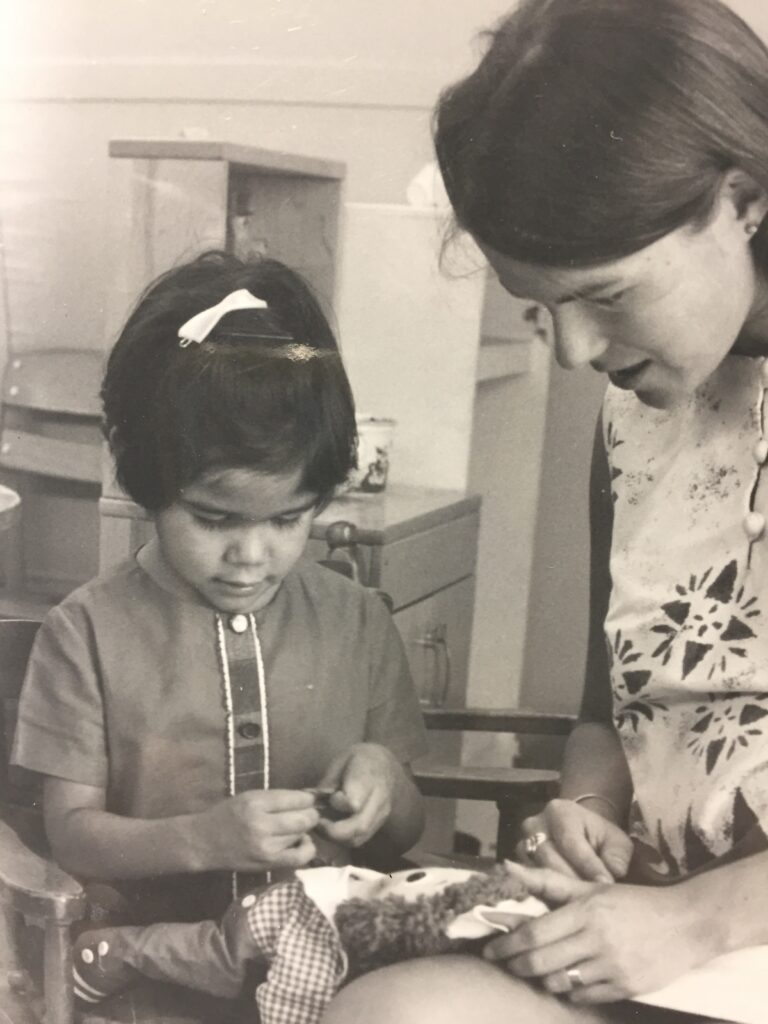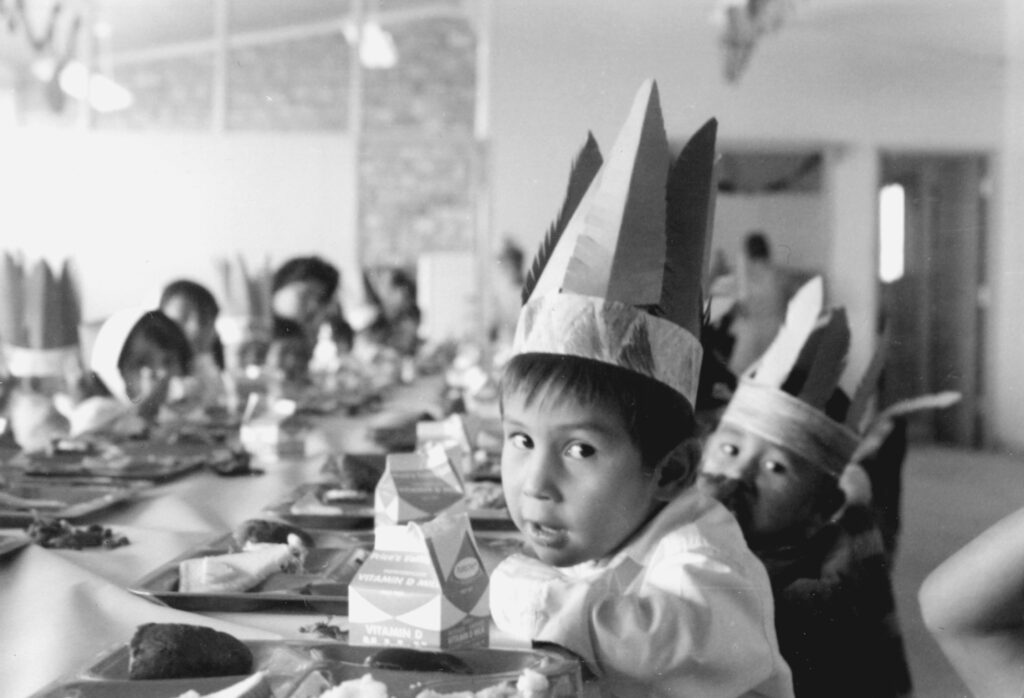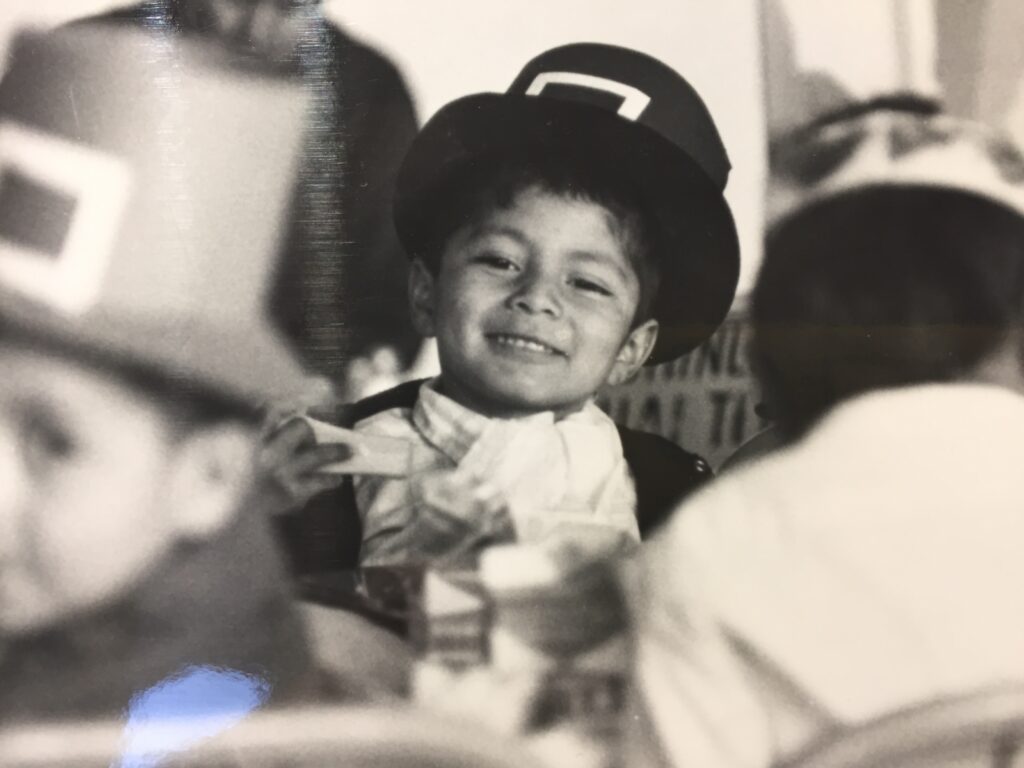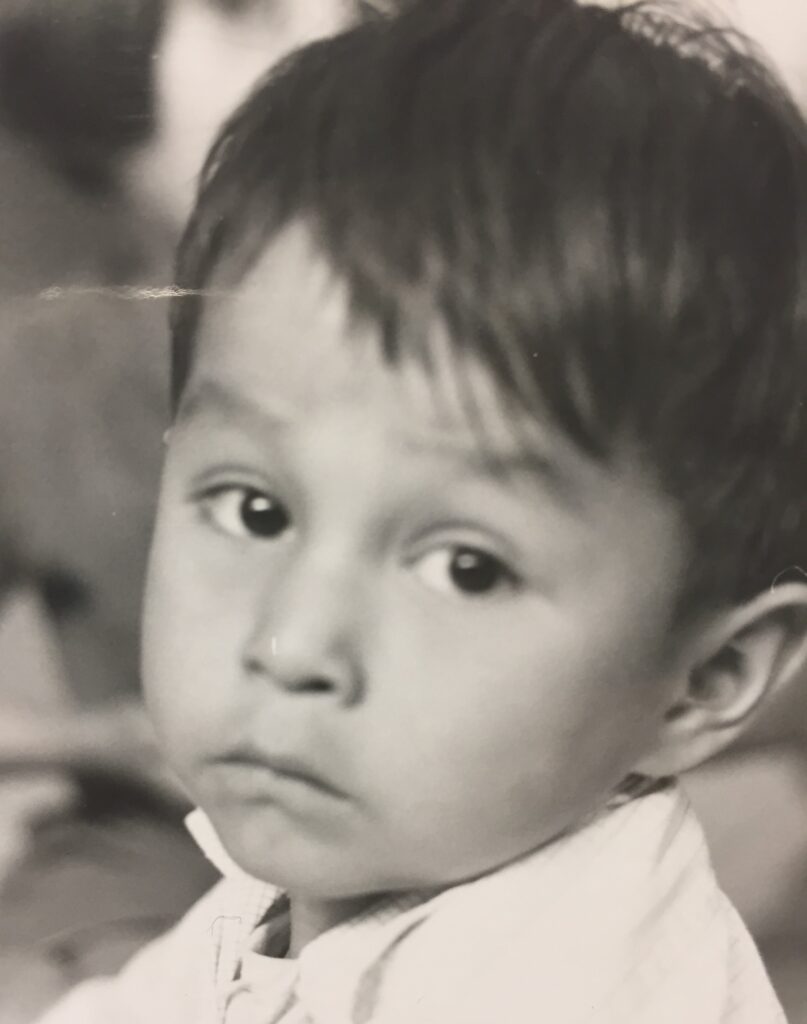When I lived in Chinle, Arizona, heart of Navajo country in the 1970s, I struggled with my role as a young, idealistic, White woman. I arrived with so much good intention and so much ignorance, in equal amounts. I have always felt that those seven years were the most significant in my life. Navajos taught me to be patient, to listen and learn, and to drop all assumptions and expectations about what was needed and what I had to offer.
And the learning is not over. The recent revelations of the horrific treatment of Native children in boarding schools in both Canada and the US hit me hard. While in Chinle, I was a teacher’s aide for a Headstart class. Those little ones were 3-5 years old, many living in hogans with no utilities, most speaking no English. Unsure what it meant to be going to “school,” they were wide-eyed and cautious in the classroom. Outdoors on the playground, they came to life, rambunctious and free. After graduating from Headstart (in caps and gowns) they went on to the local public elementary school, or to the local boarding school, depending on the preference of their parents and the distance from the bus route.
I knew the history of bad treatment in boarding schools — native language forbidden, hair cut, forced labor, and worse — and I assumed that was a thing of the past. But in recent reports the abuse is documented into the 1970s, and of course abuse of other kinds continues to this day. I am haunted by the possibility – probability? — that those children whom I loved so dearly and can still see today experienced that kind of abuse.
The vividness of recent reports and the timeline also deepens my understanding of the Navajo staff under whom I worked. They were middle-aged and products of the Bureau of Indian Affairs boarding school system. I remember being struck by their seriousness, sometimes verging on somber. Surrounded by beautiful, lively little Navajo children with long lives ahead of them, the adults seemed almost to be grieving. I didn’t understand then and wondered what there was to be so sad about. I understand now, so many years later. They themselves had been taken away from their families, put in a foreign and hostile place where they were shamed (at best) and tortured (at worse) for being who they were. They knew the future these children faced and they would do everything they could to prepare them for what lay ahead.
Enter Lucy, the naïve White lady, ready to help. I assumed that what I could bring to the situation was a positive reinforcement of Navajo culture for these little ones who were about to enter the White world. I wanted them to teach me Navajo, I wanted grandpas to come and tell traditional stories, I wanted to make little pots out of the abundant mud outside the trailer classroom. My bosses, the Navajo staff, were dismayed. What good was this White lady? She didn’t understand at all! And they were right. I didn’t realize that the gift I brought, the expertise I could offer, was a preview, an orientation into the White world.

There were many instances of cross-cultural misfiring. I had the kids all sit on the floor in a circle while I read a book to them. Horrified, Mrs. Baldwin the head teacher immediately ordered them all back in their chairs, sitting up straight. Outside I turned on the hose and ran water onto the ground to make a little river for the paper boats we had made. Mrs. Baldwin’s lips pursed together as she quickly turned off the water and sent us all inside. She was right. I was stupidly wasting a precious resource in an effort to bring fun and creativity to the classroom.

It didn’t take me long to find my place and to play the role they asked. I taught nursery rhymes and can still hear them all shouting “pee-tur, pee-tur, pun-kin eat-er.” They had no idea what they were saying (and I didn’t either), but Mrs. Baldwin knew that their lives in school would be a little easier if they already had this one on the tips of their tongues. I sewed Christmas pageant costumes, and made patterns for paper Pilgrim hats and feathered headdresses for Thanksgiving lunch. The pictures were incredibly cute – and poignant. These, too, were undoubtedly events on the agenda for the Headstarters in their near future. At least, thought the teachers and staff, this won’t be such a mystery for them.

It brings tears to my eyes. Yes, for the children of course, some of whom may have spent painful years in boarding schools. But also for Mrs. Baldwin and her staff, struggling to make a better future for their students the only way they knew how. I can see their somber faces. I can feel their grieving, for themselves, for the little ones, for the culture.
I continue to learn from those years in Chinle…

photos are from my memoir Into the Canyon: Seven Years in Navajo Country

Hindsight = 20/20 vision for all of us, dear Lucy. We were young and naive, thinking we had answers when we didn’t even know what the questions were. How can we forgive younger selves and yet hold our older, wiser selves accountable NOW for undoing the harm, taking full responsibility for the racism we perpetuated and continue our path of lifelong learning? Thank you for your candor and clarity.
Thanks, Placida, so much. So true — we thought we had the answers and didn’t even know the questions. And yes, I know that today you (and I) are on the “undoing harm” path… in good company!
Thanks Lucy. Sweet, soft and at the same time very powerful.
Good to see you and Roberto at Nancy’s. I gave Madge your greeting. 🙂
Thank you, Jan. Sweet, soft, powerful — can’t ask for better descriptors.
Lucy, what a sweet and compelling piece. Thank you for your honesty and insights. And for your dedication and service. The photos totally rock!
My experience in the Peace Corps (West Africa/1967-1969) was similar in many ways. Our “cohort” of 30+ idealistic, hopeful, kind and smart college grads met with many challenges in the Cote D’Ivoire, not least of which our youth and ignorance. Or more kindly stated, idealism. We met with a big bucket of reality/cold water when we arrived “in country” and began coming to terms with the gaps between what we hoped for and what was possible. In my case, after 1.5 years of trying to make some headway in a womens’ health education program, which was modeled on a program very successful in France (!!), I “pivoted” to opening the rarely-used classroom to young girls, mostly Muslim, to teach basic French, math and health education. These girls were SO appreciative and fun. They were not in school, because a) it cost $$ and b) they were girls; their future was already written as wives, mothers, and providers of food whose purpose in life was only to serve their families in the most traditional way. I think about them – where are they now, 50+ years later? There has been so much violence in the Cote’d’Ivoire it is sad and sobering to consider. Even under good conditions the average lifespan of women there was about 50. I endeavor always to focus on the positive, appreciate my own efforts in that regard (i.e., not be too critical of my naivete and/or lack of experience) and be a force for good. Life, she be challenging!
Wonderful story, Laurie. I can totally relate, and good for you for shifting gears and doing what you could for some very deserving and appreciative girls. I can tell you carry that time with you much as I do.
Lucy, that is an insightful and powerful story. I sometimes reflect on my 20+ years working as a tribal liaison. While I don’t like to think of myself as the product of the agency I worked for, I did at times find it difficult to “thread the needle”. Early on, I found that when I felt uncertain, approaching my work with respect, compassion, consistency, and with an open and good heart usually worked out pretty well. Thanks Lucy for sharing your reflections.
And I was lucky to see you at work, Cynthia! I was always impressed with exactly those qualities you showed — respect, compassion, consistency, and the open, good heart. The agency was lucky to have you wearing the uniform.
from DICK LAFEVER, for whom captcha would not cooperate:
Wonderful reflection, my friend. Your heart is big and pure in purpose. Yes, we’ve all learned and grown, well there are some struggling I’m sure. I remember what Leo Buscaglia (author and professor) once said, “I’m a human becoming”!! Loved the idea that we are becoming – coming into our own. Years,hopefully, provide clarity and moments to reflect, learn, and become aware. You have done so in fine fashion.
Thank you, Dick. This means so much to me.
Such a beautiful and reflective essay! You made me remember that I was sent to the Navajo reservation in 1991 by a Wampanoag leader in Massachusetts, John Peters, to meet with Roberta Blackgoat.I thought I could help publicize how and why the Navajo removal was taking place. Instead, she helped change everything I thought I knew about Americn history and politics.
Those photos of Navajo children in pilgrim hats and Indian headdresses, celebrating Thanksgiving, a holiday that surely never took place in the form we now celebrate.
Wonderful memory of learning what you didn’t plan on learning. I remember Roberta. Such a force. Such a model for us all.
Lucy,
Your willingness to reflect and courage to capture an earlier time/experience is greatly appreciated. I just finished reading Pat Conroy’s book The Water is Wide. If you have not read it, it’s a good read with many parallels.
Thanks, Jean. I’ll look for the book — always interested in parallel paths.
[from Ella Natonabah Jones — captcha not cooperating]
Dear dearest Lucy,
Thank you for your heart-warming loving and powerful story of your time with my people in Chinle. You gained so much respect from all who knew you and from us. Government boarding schools were starting to phase out then (thank goodness!) and I can relate to some of those unkind and poignant situations. I am sure you enlightened the little ones with your presence and gifts. I would like to share some stories with you over a meal –
We are forever grateful for your friendship (over 50 years!) and the best JP a couple could have. 💜
Oh, Lucy, it was so good to revisit Navajo country and the children and your book, with you. It brought back memories of becoming aware in a different way of their reality, so down to earth, the hidden racism in so many details. I have long wanted to thank you for those insights. The photos are a treat!
Thank you, Goose. Always lovely to hear from you and so glad that the post resonated.
Thanks Lucy for these reflections. Since boyhood my life and career has been closely connected to indigenous people, as a boy on Lake Winnipeg Cree and Saulteau ( Ojibway) perticularly. Interesting to hear of your early experiences with the Navajo.I have also written a lot about the residential school tragedy im Canada. Stay well my friend!
So good to see your name, Glenn! I felt an immediate connection remembering your close ties to Natives. I’d love to see what you’ve written — feel to free to post here.
Wonderful story Lucy! The photos are fantastic and the boy in the pilgrim hat is unbelievable. Your statement that “we came with the answers not knowing what the questions were” kind of sums it all up. We should have gone to them seeking answers. Thank you for sharing.
Thanks, Amy. Quite right about who had the answers — I’m grateful I stayed long enough (7 years) to get at least some of the answers, and that my friends were patient!
So very powerful Lucy – you are one of the most genuine, loving, caring and honest people I’ve ever known with the purest intentions. We’ve all learned along the way, and that’s all we can ask of ourselves.
So true, Susan, we just keep learning…sometimes over and over again! Take care, dear friend, and keep learning.
Hi Lucy,
Thank you for sharing. Cross-cultural helpmates engage in such a fraught activity, for both the giver and the receiver. But in particular, it is always good to remind those who would give help of the value of humble openness. Your gentleness in telling such an intense story resonates with and enriches those of us who are reading it.
Rhea
This means so much to me, Rhea. I really appreciate your kind and wise words. May we all have that humble openness, as you say, in situations that are challenging.
Hello Lucy,
I read your book, “Into the Canyon” with curiosity and it brought back a lot of memories, loved it. DNA families, Farmers Insurance, JP, Mrs. Baldwin….etc. I found out about your book from Fred and Bev. It would be awesome to hear from you.
Elouise
Hello Elouise! What a surprise to hear from you and what a treat. Thank you so much for getting in touch. I’m glad you read “Into the Canyon” — those memories of Navajoland, Chinle and Navajo friends are very precious for me. I will email you news from here. thank you again!